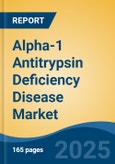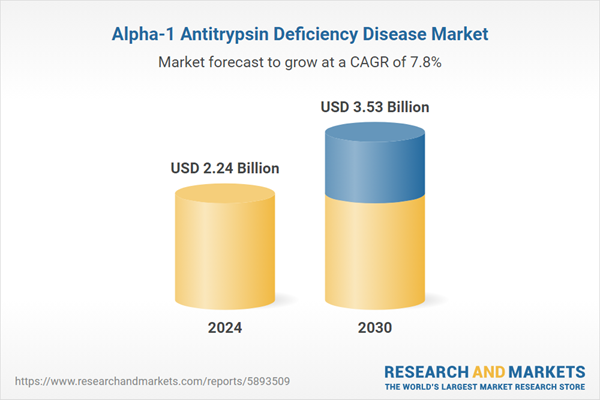Speak directly to the analyst to clarify any post sales queries you may have.
10% Free customizationThis report comes with 10% free customization, enabling you to add data that meets your specific business needs.
As research advances and awareness grows, the Alpha-1 Antitrypsin Deficiency Disease Market is undergoing transformations, offering both challenges and opportunities. Alpha-1 antitrypsin is a protein produced by the liver that plays a crucial role in protecting the lungs from damage caused by enzymes released during inflammation. In individuals with Alpha-1 Antitrypsin Deficiency Disease, a genetic mutation leads to the production of a misfolded protein that accumulates in the liver rather than being released into the bloodstream. This deficiency results in a higher susceptibility to lung diseases like chronic obstructive pulmonary disease (COPD) and liver diseases like cirrhosis.
The Alpha-1 Antitrypsin Deficiency Disease market is relatively small due to the rare nature of the disease. However, it is gaining attention from researchers, pharmaceutical companies, and healthcare providers. The market is characterized by a few key players specializing in diagnostics, treatments, and therapies. These companies focus on developing therapies that aim to address the underlying deficiency and manage associated complications. Advancements in biotechnology, genomics, and personalized medicine have enabled the development of more targeted and effective therapies for Alpha-1 Antitrypsin Deficiency Disease.
These innovations have the potential to revolutionize treatment approaches, leading to better patient outcomes and improved quality of life. Government initiatives and increased research funding have played a pivotal role in driving the growth of the global Alpha-1 Antitrypsin Deficiency Disease market. As awareness about rare diseases like Alpha-1 Antitrypsin Deficiency Disease increases, governments and regulatory bodies are introducing policies and programs to support research, diagnosis, and treatment development for such conditions. Funding for research projects, clinical trials, and patient support programs have attracted the attention of pharmaceutical companies and researchers, leading to accelerated advancements in the field.
Key Market Drivers
Growing Patient Population
Alpha-1 Antitrypsin Deficiency (AATD) is a rare but serious genetic disorder that impairs lung and liver function, primarily due to insufficient levels of the alpha-1 antitrypsin protein. Though historically underdiagnosed, awareness surrounding AATD is steadily increasing. According to the Alpha-1 Foundation, it is estimated that 1 in 2,500 individuals in the United States may have the condition, but only a fraction have been properly diagnosed. This growing recognition is leading to a larger identified patient pool, highlighting the urgent need for improved diagnostic infrastructure and targeted therapies to manage and treat the condition effectively.Misdiagnosis remains a significant hurdle in the clinical journey of many AATD patients. Because symptoms such as shortness of breath and wheezing overlap with more common conditions like asthma or chronic obstructive pulmonary disease (COPD), proper diagnosis is often delayed. However, with the rollout of improved diagnostic tools and broader genetic testing programs, correct identification is becoming more feasible. A 2023 study indicated that over 60% of newly confirmed AATD cases were initially misdiagnosed, underscoring the critical importance of awareness campaigns and early screening initiatives in catching the disease sooner and enabling timely treatment interventions.
As the pool of diagnosed patients expands, so does the interest from pharmaceutical companies and researchers to develop targeted treatments. Enzyme replacement therapies (ERTs), which replenish the deficient alpha-1 antitrypsin protein, have become a cornerstone in managing AATD. These therapies help reduce lung inflammation and preserve respiratory function. At the same time, advancements in gene therapy and RNA-based treatments are providing hope for long-term or even curative solutions. The clinical pipeline is expanding rapidly, with a number of therapies in various stages of development, targeting both symptomatic relief and genetic correction.
The availability of multiple therapeutic options is not only enhancing patient care but also creating new opportunities in the healthcare market. This is especially true as physicians are becoming more equipped to tailor treatments to the severity and progression of the disease. Increasing participation in patient registries and real-world evidence collection are further contributing to a deeper understanding of AATD and enabling personalized medicine approaches. As more individuals are diagnosed and gain access to effective care, the growing patient population will continue to be a central driver in the advancement of the Alpha-1 Antitrypsin Deficiency Disease treatment landscape.
Key Market Challenges
Under diagnosis and Misdiagnosis
One of the most pressing challenges in the Alpha-1 Antitrypsin Deficiency (AATD) market is the high rate of underdiagnosis. Due to the rarity of the condition and low awareness among both patients and primary care providers, AATD often goes undetected for years. Many individuals remain asymptomatic until the disease has significantly progressed, making early intervention difficult. Even when symptoms appear such as shortness of breath or recurrent respiratory infections - they are frequently attributed to more common conditions like asthma or chronic obstructive pulmonary disease (COPD). This diagnostic delay not only worsens patient outcomes but also limits the window of opportunity for implementing effective treatments and managing disease progression proactively.Misdiagnosis compounds the challenge, as individuals with AATD are often treated incorrectly for unrelated respiratory or liver conditions. These inappropriate treatments can lead to ineffective care, increased healthcare costs, and a delay in addressing the root genetic cause of the symptoms. For example, corticosteroids may be prescribed under the assumption of asthma, when in fact, AATD-related lung damage requires enzyme replacement or targeted therapy. Moreover, many clinicians lack familiarity with the specific diagnostic tests needed such as serum AAT levels and genetic testing - leading to oversight in patient evaluation. This systemic issue highlights the need for increased physician education, standardized screening protocols, and public awareness campaigns to ensure timely, accurate diagnosis and improve long-term patient care.
Key Market Trends
Technological Advancements
Technological strides in genetic screening have enabled early detection of Alpha-1 Antitrypsin Deficiency Disease. Genetic tests can identify specific mutations associated with the deficiency, allowing healthcare providers to diagnose individuals even before symptoms manifest. This proactive approach empowers patients to make informed decisions about their health and lifestyle, potentially mitigating the severity of complications. Further, the advent of precision medicine, which tailors treatment plans based on an individual's genetic makeup, is revolutionizing Alpha-1 Antitrypsin Deficiency Disease management.With insights gleaned from genetic testing, medical professionals can design personalized interventions, optimizing treatment efficacy and minimizing adverse effects. The emergence of gene therapy and gene editing technologies is creating exciting avenues for treating genetic disorders like Alpha-1 Antitrypsin Deficiency Disease. Researchers are exploring ways to replace or correct the mutated gene responsible for Alpha-1 Antitrypsin Deficiency Disease, potentially restoring normal protein production. These innovative approaches hold the promise of not just managing the symptoms but addressing the root cause of the condition. Telemedicine has become an essential tool in managing chronic diseases.
Patients with Alpha-1 Antitrypsin Deficiency Disease can now access remote consultations with specialists, receive real-time guidance, and monitor their health using wearable devices. This facilitates regular check-ins and timely interventions, ultimately enhancing the overall quality of care. As the technological landscape continues to evolve, the prospects for individuals with Alpha-1 Antitrypsin Deficiency are looking increasingly optimistic. Innovative therapies, precise diagnostics, and personalized treatment plans are reshaping the Alpha-1 Antitrypsin Deficiency Disease landscape, offering renewed hope to patients and their families.
However, challenges such as ethical considerations, accessibility, and cost-effectiveness must also be addressed to ensure that the benefits of these technological advancements are equitably distributed. The application of big data analytics and artificial intelligence (AI) in medical research has expedited the identification of potential drug candidates. AI algorithms can analyze massive datasets to pinpoint molecules that could modulate AAT production or function, expediting the drug discovery process.
Key Market Players
- Shire plc
- GlaxoSmithKline plc
- CSL Behring
- AstraZeneca Plc.
- Grifols S.A.
- Teva Pharmaceutical Industries
- Boehringer Ingelheim International GmbH
- Kamada Pharmaceuticals
- Pfizer Inc.
- Baxter International Inc.
Report Scope:
In this report, the Global Alpha-1 Antitrypsin Deficiency Disease Market has been segmented into the following categories, in addition to the industry trends which have also been detailed below:Alpha-1 Antitrypsin Deficiency Disease Market, By Product:
- Alpha-1 Proteinase Inhibitor
- Bronchodilato
- Corticosteroid
- Oxygen Therapy
Alpha-1 Antitrypsin Deficiency Disease Market, By Route Of Administration:
- Injection
- Oral
- Inhalation
Alpha-1 Antitrypsin Deficiency Disease Market, By Distribution Channel:
- Hospitals Pharmacy
- Retail Pharmacies
- Online Pharmacies
Alpha-1 Antitrypsin Deficiency Disease Market, By Region:
- North America
- United States
- Canada
- Mexico
- Europe
- France
- United Kingdom
- Italy
- Germany
- Spain
- Asia-Pacific
- China
- India
- Japan
- Australia
- South Korea
- South America
- Brazil
- Argentina
- Colombia
- Middle East & Africa
- South Africa
- Saudi Arabia
- UAE
Competitive Landscape
Company Profiles: Detailed analysis of the major companies present in the Global Alpha-1 Antitrypsin Deficiency Disease Market.Available Customizations:
With the given market data, the publisher offers customizations according to a company's specific needs. The following customization options are available for the report.Company Information
- Detailed analysis and profiling of additional market players (up to five).
This product will be delivered within 1-3 business days.
Table of Contents
Companies Mentioned
- Shire plc
- GlaxoSmithKline plc
- CSL Behring
- AstraZeneca Plc.
- Grifols S.A.
- Teva Pharmaceutical Industries
- Boehringer Ingelheim International GmbH
- Kamada Pharmaceuticals
- Pfizer Inc.
- Baxter International Inc.
Table Information
| Report Attribute | Details |
|---|---|
| No. of Pages | 165 |
| Published | August 2025 |
| Forecast Period | 2024 - 2030 |
| Estimated Market Value ( USD | $ 2.24 Billion |
| Forecasted Market Value ( USD | $ 3.53 Billion |
| Compound Annual Growth Rate | 7.8% |
| Regions Covered | Global |
| No. of Companies Mentioned | 10 |









